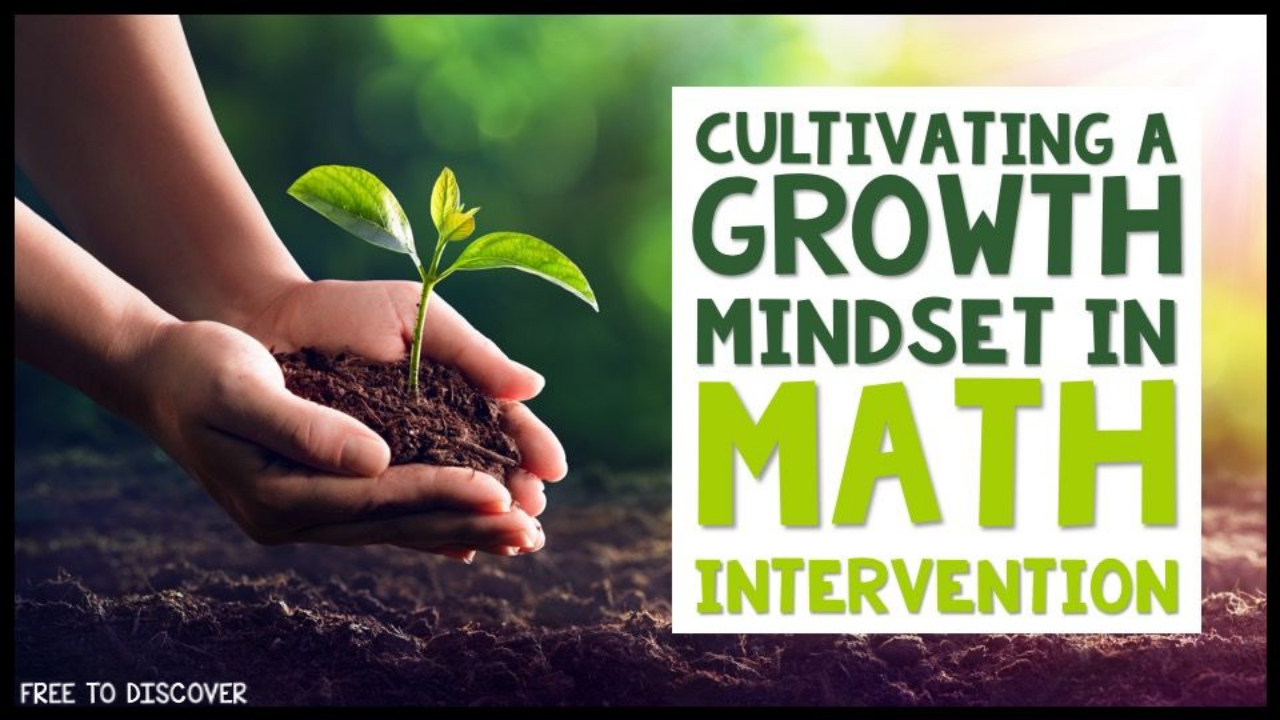
Cultivating a Growth Mindset in Math Intervention
What is growth mindset in education? Growth mindset is the belief that one's knowledge and ability is malleable. We want our math students to embrace a growth mindset in order to foster the belief that they can improve their math skills through consistent effort and hard work. Cultivating a growth mindset in math intervention is especially important in order to encourage students that they can do hard things.
What is fixed mindset vs growth mindset? Alternatively, a fixed mindset is the belief that one's knowledge and ability is limited. Students with a fixed mindset may say things such as "I'm not good at math" or "I'm not a math person." It is really hard to provide math intervention when students enter with a fixed mindset. So how do we go about helping our math students develop a growth mindset? What can we do to support our students by cultivating a growth mindset in math intervention?
Share the Power of "YET"
"Yet" is the perfect word to use when teaching growth mindset in math. "Yet" implies that something is not the case now, but will be at some point. Are we there yet? No, but we will be at our destination soon! Is dinner ready yet? No, but we will all be gathered around the dining room table in a few minutes. Just like a seedling isn't a tree yet, kids have so much potential to become who they want to be and achieve what they want to accomplish when the proper tools and resources are used. In math intervention, it's essential that students feel its okay to not know yet. With effort they will increase their math knowledge through skill development.

Set the Expectation
Verbally set the expectation from day one. I don't know what your experiences have been in other math classes, but in this class you will be expected to master all grade level topics. We will keep working at it until you've got it down. You can do this. Together we'll persevere and learn a lot. Letting students know that sitting back and cruising through the year accomplishing the minimum is not an option can help alleviate some issues right off the bat. Continue to reinforce this message throughout the year. This is especially true in math intervention when students are likely reviewing previously taught material that they did not master the first time around.
Model Growth Mindset
Teachers can share motivating thoughts with students, but even the best soapbox speech can't match modeling growth mindset for students. Does technology intimidate you? Push yourself to try something new and mention to your students in a casual aside how you persevered through mastering the use of that HDMI cable. (Just me?? 😆) Share a story with your students about a time you persevered through something you didn't know how to do yet. And model a growth mindset in front of them. Lead by example when working through the embarrassment of making a mistake. Answer a question with the response, "I'm not sure about that yet, but let me look into that and get back to you tomorrow."

Praise Perseverance
Remind students that they can do hard things. Success comes from working hard, persevering, and trying again and again. When students successfully work through a tough problem, praise their perseverance, not the final product. Too often in math, students focus on getting the right answer. Mathematics is about problem solving. Like actually solving real problems. This takes grit, patience, and perseverance. Find ways to reward and assess perseverance. When students try to use a shortcut like an app, send them back to redo the problem and emphasize the importance of the process over the final answer.
Monitor Progress
When students monitor their own progress in math intervention, they are more likely to take ownership of their learning. Believing that they can improve and learn is growth mindset. Choose something measurable and consistent and provide students with the time and tools needed to document their progress. This could consist of graphing homework completion, recording quiz scores, or organizing a checklist of mastered intervention skills. This type of organization tool is a useful and practical growth mindset activity for students.
Put it All Together
Math intervention is most effective when students embrace a growth mindset. We need our students to understand that even though they may not have mastered a skill YET, they absolutely can through hard work and determination. Remind students that there is no option for failure. When they demonstrate grit, they will see huge success as a result. Don't put so much pressure on yourself to be perfect in front of your students. As adults, we are always learning and growing, too. Make sure students see this. It's not about perfection, it's about progress and perseverance when things get tough. When students measure their own progress, they can visually see their improvement, which results in increased math confidence and a willingness to keep trying.
Free to Discover Math Skill Drills are the perfect tool for cultivating a growth mindset in math intervention. Students complete a practice worksheet of the same 20 skills each week. Students learn to use their previous assignments as reference for new versions. They log their mastery of topics and measure their growth. By consistently drilling the same 20 skills, students are more likely to reach mastery than if they complete a less consistent amount of practice on a wide variety of skills. In other words, they go a mile deep, not a mile wide. Skill Drills are available for grade 5 through Algebra 2 and are loved by math teachers.
What are teachers saying about this resource?
"I use these as full class intervention during extra math time to either practice or reteach math skills. It makes planning and prep easy for me." -Stephanie, 7th grade teacher
"This was a great document to pull resource from for RTI." -Dana
"This is a great resource to use as a bell ringer or reinforce basic math skills. I often use it to help students who struggle with a particular skill." -Julie
"These skill drills are a life saver! The students work on them after quizzes and tests for additional practice and review. A truly great resource!" -Adrienne
Learn more about these math intervention resources here!
Sign up below to become part of the Free to Discover community.

Join the Free to Discover community!
When you subscribe, you'll access Issue 1 of our monthly newsletter for secondary math students!


